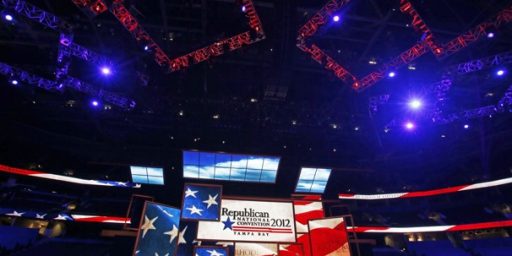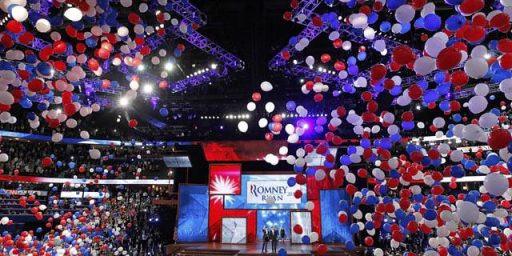Networks to Snub Conventions
The Hill — TV to Snub Conventions
The major TV networks are planning to cut coverage at the political conventions, ignoring major speeches early in the week.
The Republican and Democratic parties hope to nudge the networks into more live coverage, but broadcasters have concluded that there will be little news to report. “We know we’re going to cover the nomination and the [nominee’s] speech,†said one network’s spokeswoman, but “we’re not sure about the first two days.†Previously, networks covered each day of the convention.Sen. John Kerry (D-Mass.) and President Bush have already locked up their nominations, so the networks don’t feel obliged to cover the four-day windup to their acceptance speeches. “They are very tightly choreographed events,†said the spokeswoman. “There is virtually no news that is made at the conventions any more.â€
Sources say each networks will likely reduce coverage from four years ago, even though coverage in 2000 already was scaled back from historic levels. Networks could provide as little as an hour of live coverage on the penultimate nights (Wednesdays), with perhaps two hours for the Thursday finale.
This is a significant challenge for candidates. Kerry must use the convention to define himself before a national audience, presenting his carefully packaged image as a veteran and a leader, and overcome characterizations in Bush’s TV ads that he is a flip-flopper, observers say. Bush, whose approval ratings dropped to 48 percent in the latest Gallup poll, needs his convention to reestablish his credentials on terrorism, security, and the economy, and counteract any post-convention “bounce†by Kerry. Harry Truman is the only president to win reelection despite a June approval rating below 50 percent.
Democrats and Republicans will continue talks with the networks this week and plead for more coverage. “We are gathering information, talking to the networks,†said Peggy Wilhide, communications director for the Democratic convention in Boston. “The final decisions rest with them as to how much they will cover. We’re trying to make it as attractive as possible…â€But Democrats are already turning elsewhere: “We have done a lot of outreach to non-traditional [media] outside of the traditional big five,†said Wilhide. Black Entertainment Television will be broadcasting nightly from Boston’s Fleet Center. The Spanish language Univision will have a correspondent there. MTV, Comedy Central and ESPN will also be producing convention shows. The cable political network C-SPAN plans gavel-to-gavel coverage from the convention floor, as it has in the past. The Fox News Channel, CNN and MSNBC, and Internet coverage can fill some of the void left by the withdrawing networks. The proliferation of media has given the networks an excuse to scale back coverage, observers add.
Don Ritchie, associate Senate historian, said: “The major networks … make more money when they have comedies and ‘Law and Order’ on than when they have politics on. That’s the sad part of it.â€
If the networks skip the first half of the convention, they would miss events likely to create buzz in Washington. Democrats are counting on a prime-time speech by Sen. Edward Kennedy (D-Mass.) to excite the party̢۪s base. Former President Bill Clinton, Sen. Hillary Clinton (D-N.Y.), former Vice President Al Gore and presidential candidate the Rev. Al Sharpton will all speak. Former New York Mayor Rudy Giuliani (R), first lady Laura Bush, and California Gov. Arnold Schwartzenegger are scheduled to speak during the first two days of the GOP convention in New York.
I can’t blame the networks. I’m old enough to remember when the Big 3 covered them gavel-to-gavel. But with the rise of cable news channels, there really isn’t much rationale for forcing these incredibly boring displays on non-junkies. Indeed, in the cable/satellite era, there’s no way to do that anyway–people would just flee to an off-network channel.




Except, I think, for people who do not subscribe to cable or satellite service. One could make the argument that broadcast companies operate on public airwaves and should therefore give up more time to political coverage. As well, nearly 50 percent of the populace doesn’t have Internet.
I mean, C-Span is giving gavel to gavel coverage anyway, so that’s your political junkie source. But the network coverage clearly isn’t intended by the parties for political junkies, but for the non-junkie.
This is simply the parties’ comeuppance for their decades-long effort to strip the conventions of even the chance of drama. They are no longer news in any sense, so there’s no reason for the “news” divisions of the major networks to present them whole. They are pseudo-events; really, they’re attempted infomercials, and damned long ones.
I think Henley’s probably closer to the truth than my initial reaction, which is that the networks started moving away from gavel-to-gavel coverage at about the same time us snake-handlin’ yokels out in flyover country stopped voting the way the networks’ talking heads tell us to vote.
But I’m not convinced there isn’t some of that in their decision too…
I quit watching any portion of the nominating conventions years ago, so that prejudices me on the networks’ rationale for limiting coverage: declining (virtually non-existent?) viewership.
Remember, all that matters with the networks is how many eyeballs they can capture. Without that, nothing else matters.
—